Energy & Environment
World Environment Day 2025
Shrink Your Plastic Footprint
Posted On: 04 JUN 2025 2:11PM
“India gives a special attention to plastic waste management. We are resolute in our efforts to reduce single use plastic and micro-plastic pollution for sustainable development along with a prospering biodiversity.”
~Prime Minister Shri Narendra Modi
Summary
- This year, World Environment Day will be observed on June 5, with a special focus on ending plastic pollution
- Led by UNEP since 1973, it's the world’s largest platform for environmental action.
- India backs global efforts via Basel Convention, G20 Osaka Vision and High Ambition Coalition.
- Plastic Waste Rules 2021 ban single-use items and regulate plastic carry bags.
- EPR Portal holds producers accountable; 103 lakh tonnes plastic waste processed till Dec. 2024.
- India Plastic Challengeand National Expo promote plastic alternatives.
- Plastic Parks and CSIR tech turn waste into fuel and recyclable products.
- Swachh Bharat Mission boosts rural and urban plastic waste management.
- Kamalpur and Trichy show success with compostable bags and cloth bag drives.
- India drives a plastic-free future through policy, innovation and public action.
Introduction
Every time you sip water from a plastic bottle or toss a plastic wrapper, a part of it might end up in a river, an oceanor even in your own body. Over the years, plastic has silently crept into every corner of our planet, from the deepest oceans to the food we eat and the air we breathe. This World Environment Day is a time for the world to come together to protect our planet. It is observed every year on June 5 and is led by the United Nations Environment Programme
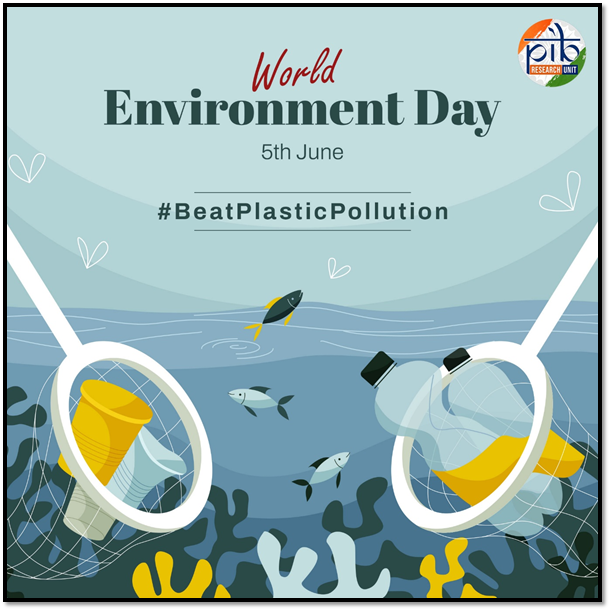
(UNEP). In 2025, the Republic of Korea is hosting the global celebrations. This year the day will focus on ending plastic pollution.
Global Call to Beat Plastic Pollution
Led by the United Nations Environment Programme (UNEP) since 1973, World Environment Day is the largest global platform for environmental outreach. Celebrated in over 150 countries, it unites people to take action on urgent environmental issues.This year, World Environment Day supports UNEP’s campaign to #BeatPlasticPollution, focusing on real solutions to one of the planet’s most fixable problems. The campaign urges everyone to refuse, reduce, reuse, recycle and rethink how we use plastic in daily life.
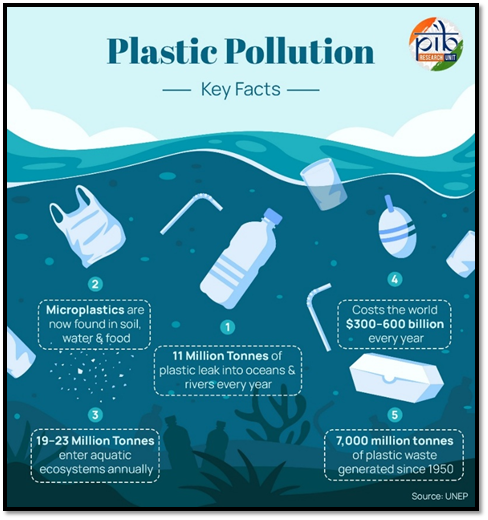
Tackling Plastic Pollution: India’s Global Commitment
To fight the growing crisis of plastic pollution, India has joined hands with the global community by participating in major international conventions and initiatives. Here's a look at the key steps India has taken on the global stage:
1. Basel, Rotterdam and Stockholm Conventions (2019): In May 2019, India actively participated in the joint meetings of these three major conventions in Geneva, Switzerland.India actively supports global efforts to regulate hazardous waste and chemical use. It opposed e-waste dumping in developing countries and advocated for stricter global rules. India played a key role in bringing plastic waste under the Basel Convention's Prior Informed Consent (PIC) procedure and backed the phase-out of single-use plastics, promoting global partnerships against illegal plastic dumping.
2. G20 Osaka Blue Ocean Vision (2019): On 2 July 2019, the Confederation of Indian Industry (CII) and UNEP welcomed the G20 Osaka Blue Ocean Vision.As part of the G20 Leaders’ Declaration on 29 June 2019, India and other member countries agreed to take strong action against plastic pollution. They committed to reducing marine plastic litter and microplastics and set a goal to stop adding any new plastic waste to the oceans by 2050.
3. High Ambition Coalition for Nature and People (2021): India joined the High Ambition Coalition (HAC) for Nature and People in January 2021 during the One Planet Summit held in Paris.This global initiative aims to protect at least 30% of the world’s land and oceans by 2030. It also focuses on strengthening biodiversity by reducing plastic pollution and keeping ecosystems healthy.
India’s Key Initiatives to Manage Plastic Waste
India has adopted a strong legal and policy framework to tackle the plastic waste crisis. Through laws, reforms and missions, the country is working to ensure responsible plastic use, recycling, and disposal.
The Ministry of Environment, Forest and Climate Change, under the Environment (Protection) Act, 1986, has notified various waste management rules to ensure the environmentally sound handling of waste. One such rule is the Plastic Waste Management Amendment Rules, 2021, which strengthens regulations on plastic waste to promote sustainability and reduce pollution.
Key provisions under the Plastic Waste Management Amendment Rules, 2021:
🔹Ban on Identified Single-Use Plastics: Items with low utility and high littering potential banned from 1st July 2022.
🔹Ban on Thin Plastic Carry Bags: Plastic bags with thickness less than 120 microns banned from 31st December 2022.
🔹Ban on Lightweight Non-Woven Bags: Non-woven plastic carry bags below 60 GSM (grams per square meter) banned from 30th September 2021.
🔹State-Level Action: In addition to national rules, many States and UTs have issued their own orders and notifications for partial or complete bans on single-use plastics and carry bags.
Responsible Plastic Use and Disposal
India is promoting sustainable plastic management through dedicated initiatives. These efforts aim to reduce pollution, support recycling and boost eco-friendly industry growth.
Extended Producer Responsibility (EPR), 2022: Presently, a total of 50,131 of Producers, Importers and Brand Owners have been registered on the Centralized Online Extended Producer Responsibility (EPR) Portal on Plastic Packaging.2840 Plastic Waste Processors registered till till now and 103 lakh tonnes of waste processed through the Centralized EPR Portal till Dec. 2024.
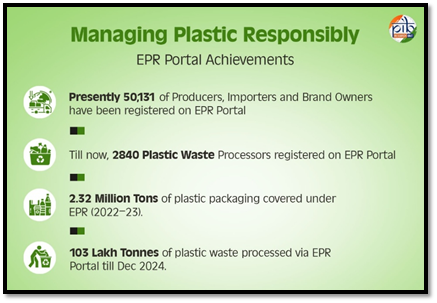
Extended Producer Responsibility (EPR) means companies that make or sell plastic products must take care of the plastic waste they create. They are responsible for collecting, recycling, or safely disposing of it after use.
Safe Food Packaging: The FSSAI’s Food Safety and Standards (Packaging) Regulations, 2018 set standards for safe food packaging materials, including plastics. These rules ensure packaging follows Good Manufacturing Practices and meets strict migration limits to prevent contamination.
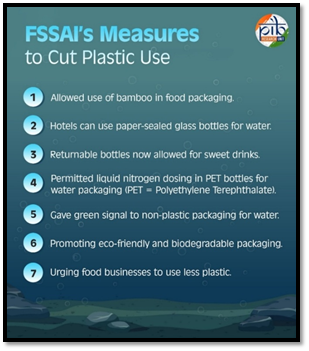
Building a Sustainable Plastic Economy
India is also using science and technology to build a self-reliant circular economy, reduce plastic pollution and create jobs. Key steps taken:
- Innovation & Industry Partnerships
- TDB-DST &APChemi Pvt. Ltd. (2025): Agreement signed to produce purified pyrolysis oilfor making circular plastics and sustainable chemicals.
- CSIR MoU with DDA & Delhi Municipal Corporations (2019): To set up a plant to convert waste plastic into diesel and tiles using CSIR-developed technology.
- CSIR-IICT, Hyderabad: Converts plastic waste into fuel oil, monomers, hydrogen & green plasticizers. Tech shared with 5 private companies.
- TDB funded E-waste & Li-battery recycling plants using indigenous technology.
- Research & Technology Boost
- CSIR investment: ₹345 crore sanctioned in 3 years for 15 projects focused on sustainability innovations.
- 18 Centres of Excellence (CoE) by DCPC: Research on eco-friendly, biodegradable, and bio-based products, and plastic recycling technologies.
- Plastic Parks
Plastic Parks have become a key part of India’s strategy to manage plastic waste, promote recycling, and support the chemical industry. Under the New Scheme of Petrochemicals, the government of India offers grant funding of up to 50% of the project cost, with a maximum limit of Rs. 40 crore per project. So far, 10 Plastic Parks have been approved across various states.
Plastic Parks are specially developed industrial zones where many plastic-related businesses work together in one place. These parks have the right facilities for making, processing and even recycling plastic products. The aim is to promote eco-friendly practices, such as reusing and recycling plastic, while also boosting the local economy.
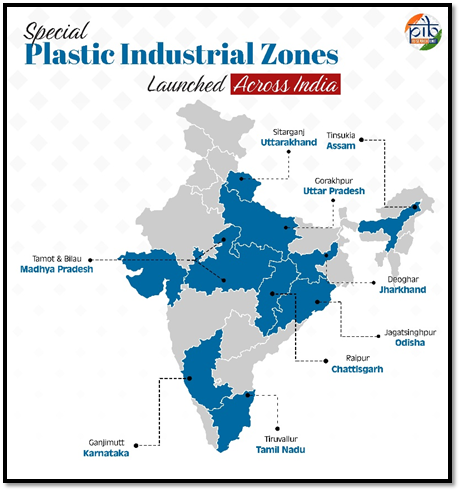
Strengthening Urban and Rural Waste Management
India is reinforcing its sanitation and waste management infrastructure through of Swachh Bharat Mission in both rural and urban areas. These missions emphasize plastic waste management, scientific processing of wasteand community-led cleanliness initiatives.
Swachh Bharat Mission (Grameen) Phase II
- Phase-II of SBM (G) has been launched with effect from 1st April, 2020.
- Focuses on rural waste management, including plastics.
- Offers up to ₹16 lakh per block for building Plastic Waste Management Units (PWMUs).
- Allows setting up PWMUs in cluster mode to cover multiple blocks.
Swachh Bharat Mission Urban 2.0
- Launched in October 2021, SBM-U 2.0 aims to create "Garbage Free Cities" with 3-star certification for all Urban Local Bodies.
- Focuses on door-to-door waste collection, source segregation, and scientific processing of municipal solid waste.
- Allocated Rs. 1,41,678 crores for 2021–2026, targeting plastic reduction, air pollution control, and bio-remediation of legacy waste sites.
Local Innovations Drive Plastic Waste Reduction
Local bodies across India are driving impactful change through innovative, community-driven solutions to combat plastic pollution. Recently, Kamalpur in Tripura and Trichy in Tamil Nadu have set inspiring examples by replacing single-use plastics with sustainable alternatives and promoting public participation.
Kamalpur, Tripura – Eco-Friendly Bags Replace Plastics
Kamalpur Nagar Panchayat has replaced single-use plastic with eco-friendly compostable bags made from PBAT, a biodegradable polymer.Certified by CIPET, these bags fully decompose in 180 days.
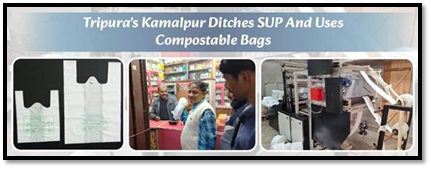
Trichy, Tamil Nadu – Markets Go Plastic-Free

To tackle the continued use of single-use plastics in markets, Trichy City Corporation with GIZ (German Society for International Cooperation) India, launched a campaign in 2022 across major farmer markets.Educated them about plastic pollution and promoted reusable cloth bags under the “ThunippaiThiruvizhai” initiative.With help of this initiativeTennur avoided 2,200 kg of SUPs in a year.KK Nagar saved 620 kg in 4 months.Woraiyur cut down 300 kg in 6 months.
These examples reflect how local innovation and public participation are key to building a plastic-free, sustainable urban India.
Conclusion
India's fight against plastic pollution reflects a deep commitment to environmental sustainability and global cooperation. From enforcing bans on single-use plastics to promoting circular economy innovations, the nation is driving impactful change at local, national, and international levels. With continued public participation, responsible industry practices, and government initiatives, India is on a determined path to shrink its plastic footprint and safeguard a greener future.
References
World Environment Day 2025
****
Santosh Kumar/ Sarla Meena/ Kamna Lakaria
(Backgrounder ID: 154549)
Visitor Counter : 2881
Read this release in:
Urdu